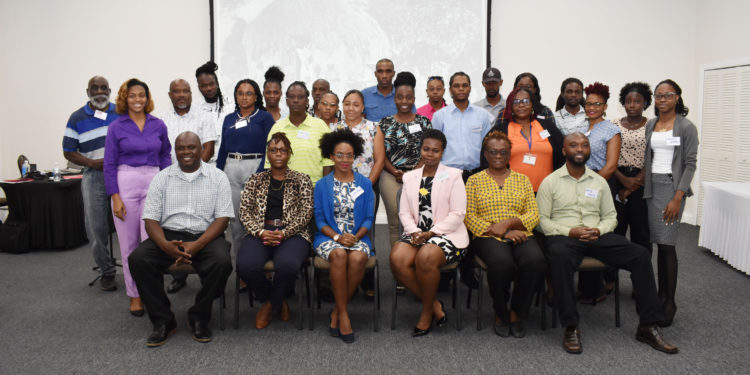BASSETERRE, ST. KITTS, November 3, 2022 (MMS-SKN) — Over twenty five participants, drawn from employees in public and private tourism sectors, are taking part in the St. Kitts Sustainable Destination Council of the Ministry of Tourism-organised two-day ‘I Speak St. Kitts Culture and Heritage Workshop 2022’ that opened on Wednesday November 2 at the CUNA Conference Centre in Fortlands, West Basseterre.
Opening the workshop was Sustainable Tourism Coordinator in the St. Kitts Ministry of Tourism, Mr Kenney Manning, who observed that according to the United Nations Educational Scientific and Cultural Organisation (UNESCO), cultural tourism is one of the fastest growing segments of the tourism industry, accounting for an estimated 40% of all tourism worldwide.
The purpose of the two-day workshop, which takes a break on Thursday November 3 to resume on Friday November 4, is to equip participants with the knowledge and skills they need to ‘speak St. Kitts Culture and Heritage’ as a means of contributing to the long-term well-being of the destination as a whole.
According to Mr Manning, the goals of the workshop are to “increase participants’ awareness and knowledge of some key aspects of St. Kitts and Nevis culture and opportunities for tourism in St. Kitts, and to increase participants’ awareness of the value and importance of protecting St. Kitts’ cultural resources and promoting sustainable tourism.”
Present at the workshop were Chair of the St. Kitts Sustainable Destination Council, who is also the Assistant Permanent Secretary in the Ministry of Tourism, Mrs Diannille Taylor-Williams, and a secretary in the Ministry of Tourism, Ms Johneal Harvey, who assisted with the registration of the participants and ensuring the smooth running of the workshop.
Facilitating the workshop was Mr Leonard Stapleton, who after a 15-year teaching career that included heading up the Geography and Social Department of the Verchilds High School took a job at Brimstone Hill Fortress National Park, a UNESCO World Heritage Site, and also served on the board of the St. Christopher National Trust, a local NGO committed to preserving and promoting St. Kitts’ heritage.
Mr Stapleton, who is a firm believer that tourism is one of the greatest opportunities to raise awareness of St. Kitts’ past and traditions, has researched St. Kitts and Nevis’ black history and wrote the book ‘Places of Memory’ which was published by UNESCO. The book features 33 sites related to the enslaved Africans on St. Kitts and Nevis and will eventually be used in high schools as part of the local history curriculum.
Day One of the workshop was divided into two sessions, where in the first session Mr Stapleton talked about Sustainable Tourism. He took time to define sustainable tourism, illustrating his lecture with a series of slides with a background of local music as he highlighted the market opportunity/demand for sustainable tourism.
“When one speaks about sustainable tourism, you have to remember that it is buttressed on 3 Ps – Planet, People, and Profit,” observed Mr Stapleton. “Most people when they hear sustainable tourism they think mostly on the planet side – the environmental side. That would only be partially correct.”
One of the most significant parts of sustainable tourism, according to Mr Stapleton, is that tourism is done in such a way that the local man shares an equitable part of the profit. He noted: “It cannot be that we are getting a million passengers, the hotel rooms are filled and making lots of profit and the local persons in the communities around St. Kitts and Nevis are not feeling the money directly.”
Session Two of the presentation, had two subsections ‘Exploring Three Categories/Elements of St. Kitts and Nevis Culture’ and ‘A Closer Look at Traditions of St. Kitts and Nevis Homes and games children played in the yard’ that were held before the mid-morning coffee break.
The session continued after the break with ‘A Closer Look at St. Kitts and Nevis Food and Drinks’, among them goat water, cook-up, black pudding, coconut confectionaries, sarsaparilla, mauby, lemonade/swank/’bebriche’, ginger beer, Harmmon, rum punch, sangria, and bush tea.
After lunch break the participants were exposed to another three subsections of Session Two. These were ‘A closer look (and listen) at St. Kitts and Nevis Music’; ‘A closer look (and listen) at St. Kitts and Nevis Music and Dance’; and ‘A closer look (and listen) at St. Kitts and Nevis forts’.
On Friday November 4, Session Three will start with a field trip that will take the participants on site visits to ‘tourism destinations’ in St. Kitts examining architectural vernacular of traditional homes and other buildings along the route from Basseterre to Cleverly Hill. They will take a tour of either Fort Charles or Cleverly Fort in Sandy Point.
After lunch they will embark on Session Four that will cover ‘Destination Action Planning’ whose main activity will be ‘Group Destination Action Planning’ to include projects focused on documentation, promotion, resurrection and preservation, and capacity building for practitioners of St. Kitts and Nevis culture, to end with group presentations.
Session Five will cover the final wrap-up that will include post assessment, end of workshop survey, and presentation of certificates to the participants.









